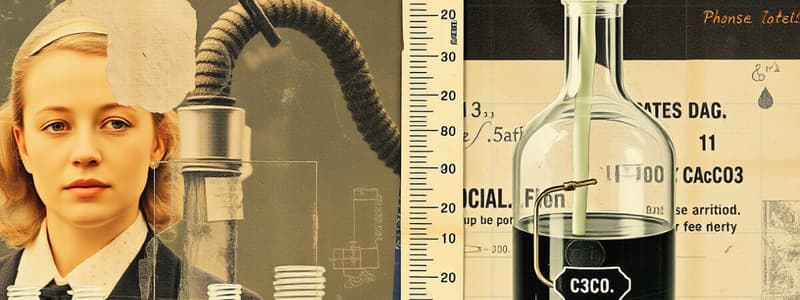Podcast
Questions and Answers
What is the primary cause of permanent hardness in water?
What is the primary cause of permanent hardness in water?
- High levels of calcium carbonate
- Presence of chlorides and sulphates (correct)
- Decomposition of bicarbonates
- Presence of bicarbonates
Which method is not effective for removing permanent hardness from water?
Which method is not effective for removing permanent hardness from water?
- Ion exchange method
- Zeolite process
- Lime soda process
- Boiling (correct)
Which ion is NOT typically associated with hardness in water?
Which ion is NOT typically associated with hardness in water?
- Sodium (correct)
- Iron
- Magnesium
- Calcium
What is the molecular weight of calcium carbonate used to express water hardness?
What is the molecular weight of calcium carbonate used to express water hardness?
Which characteristic defines hard water?
Which characteristic defines hard water?
What is Clarke's Degree defined as?
What is Clarke's Degree defined as?
Which of the following is a correct correlation of water hardness units?
Which of the following is a correct correlation of water hardness units?
Which apparatus is NOT required for the determination of water hardness?
Which apparatus is NOT required for the determination of water hardness?
What color change indicates the endpoint in the titration process?
What color change indicates the endpoint in the titration process?
What is the standard solution used in the titration to determine water hardness?
What is the standard solution used in the titration to determine water hardness?
Which of the following statements about temporary hardness is true?
Which of the following statements about temporary hardness is true?
What is the purpose of adding a drop of Methyl Orange indicator during the procedure?
What is the purpose of adding a drop of Methyl Orange indicator during the procedure?
What is the procedure to calculate the amount of salts causing hardness based on the titration results?
What is the procedure to calculate the amount of salts causing hardness based on the titration results?
Flashcards are hidden until you start studying
Study Notes
Water Hardness Measurement
- Degree's Clarke (c) measures the amount of CaCO₃ in parts per weight present in 70,000 parts of water.
- Degree's French (F) quantifies CaCO₃ in parts per weight present in 100,000 parts of water.
- Parts per million (ppm) indicates the amount of CaCO₃ in parts per weight in 1 million (1,000,000) parts of water.
- Unit correlations: 1 ppm = 1 mg/L = 0.07° Clarke = 0.1° French.
Apparatus and Reagents
- Required equipment includes a burette, beaker, conical flask, measuring cylinder.
- Use of standard N/50 HCl solution and Methyl Orange indicator for analysis.
Procedure for Hardness Determination
- Measure 50 ml of water sample in a conical flask.
- Add one drop of Methyl Orange indicator to the water sample.
- Titrate against standard N/50 HCl solution, observing color change from yellow to orange to indicate endpoint.
- Record the volume of N/50 HCl used to ascertain the hardness contributing salts, quantified as CaCO₃ for temporary hardness.
Types of Hardness
- Temporary Hardness: Caused by bicarbonates of Ca and Mg, removable by boiling. The solution decomposes to yield insoluble carbonates and hydroxides that can be filtered out.
- Permanent Hardness: Results from chlorides and sulfates of Ca and Mg. Known as non-carbonate hardness, it is not easily removed and requires more complex methods.
- Other ions contributing to hardness can include Fe²⁺, Fe³⁺, Mn, Sr, and Al, typically found in trace or negligible amounts.
Chemical Removal Methods
- Common methods include:
- Lime Soda Process: Treating water with lime and soda to precipitate hardness-causing compounds.
- Zeolite Process: Utilizing zeolite minerals to exchange hardness ions with sodium ions.
- Ion Exchange: A more sophisticated technique to remove specific ions leading to hardness.
Importance of Measuring Hardness
- Hardness is expressed in terms of CaCO₃ as it is the most insoluble salt, simplifying calculations due to its molecular weight of 100.
- Determining temporary hardness is crucial for assessing water quality that affects soap efficacy and other household applications.
Summary
- Hard water is characterized by difficulty in lathering with soap, necessitating effective measurement and potential treatment methods to improve water quality.
Studying That Suits You
Use AI to generate personalized quizzes and flashcards to suit your learning preferences.




